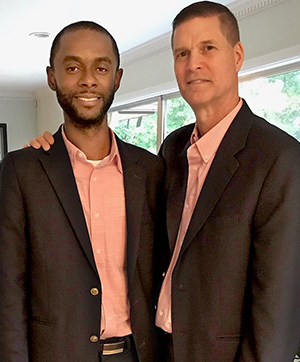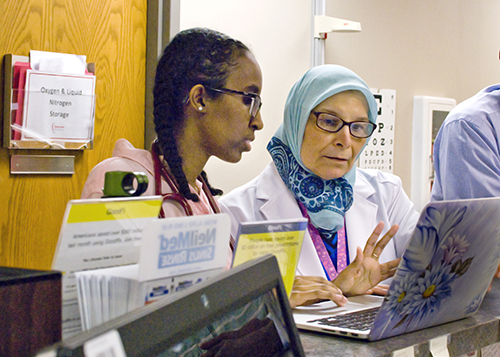
Ralf Elienne, left, lost a leg in the earthquake in Haiti and came to American with Dr. Greg Adamson who arranged for a prosthetic leg for Elienne who then graduated from college in Indiana. Adamson died June 11. (REPRINTED WITH PERMISSION)
Dr. Greg Adamson died June 11 at age 58, but his presence is still palpable at Cordoba Healthcare Clinic in Peoria where he volunteered providing orthopedic care for the uninsured and underinsured.
Clinic founder Dr. Wasim Ellahi remembers meeting Adamson for the first time in the physician lounge at Proctor Hospital and discussing the plan to open Cordoba, a specialty clinic in Peoria for patients with chronic conditions who are otherwise unable to see specialists.
Adamson, still influenced by a relief trip to Haiti following the 2010 earthquake, was immediately hooked.
“Really?” asked his wife, Michelle when she learned he was planning to be part of the clinic.
At the time, Adamson had a busy solo practice, was active in city and state medical societies and served on the Peoria County Board. He and his wife have four children, three still living at home. Yet he volunteered at the clinic every Sunday for more than a year when he cut back to every other Sunday, volunteering a full shift two days before his death.
“He had a passion for people,” Ellahi said.
Kathy Mohns, an RN working with Ellahi in his practice at Illinois Gastroenterology Institute and at Cordoba said, “I’m so glad Dr. Adamson asked to volunteer at the clinic every other Sunday the past two years so he could have more time with his family. I know he missed a lot of family events because he volunteered here.”
In speaking about Adamson, volunteers at the clinic still feel tearful and lapse from past tense to present tense when describing their admiration for him. They contend his mentorship and kindness are still a constant presence at the clinic.
Mohns said the medical students who volunteer at the clinic loved Adamson. He always had time to help and review procedures with them.

Zebib Yemane, 27, a third-year medical student at University of Illinois College of Medicine at Peoria, reviews charts with Norma Naffakh, a pharmacist. Both volunteers at Cordoba Healthcare Clinic expressed heartfelt appreciation for the kindness and compassion Dr. Greg Adamson expressed toward patients and colleagues alike. (PHOTO BY CLARE HOWARD)
Zebib Yemane, 27, a third-year medical student at the University of Illinois College of Medicine at Peoria, said, “He had a lot of energy, and he made it fun to learn. We are so early in our careers, and he showed us what a good doctor-patient interaction should be. He connected with people. He was our mentor.”
Yemane said medical students feel the stress on constantly being assessed and analyzed, but with Adamson, the feeling was collaborative, helpful and stress-free.
Raisa Ali, a lab technician at Cordoba, was sometimes called upon to help as a translator between Adamson and non-English speaking patients. She said he was able to connect to patients even in translation from Urdu to English. He conveyed his concern and commitment.
“This is a great loss for all of us. We loved him. May his soul rest in peace and may God give his family patience to deal with this loss,” Ali said.
Norma Naffakh, a pharmacist who volunteers at Cordoba, also helped with patient-doctor translation.
“Even with translation, patients feel comfortable with him. By their second visit, they are always happy to see him,” she said.
Michelle Adamson stopped by the clinic occasionally over the past three years to take extra supplies, food or miscellaneous items.
“It’s really a special place,” she said. “There is something about that place.”
After 20 years in practice as part of a major orthopedic clinic, Adamson was increasingly restless to practice medicine his own way. He went back to school and earned an M.B.A. degree. His wife was his full-time office manager when he opened his own practice in February 2015.
After he died, Cordoba’s Facebook page was flooded with messages of condolence. One, written by Ralf Elienne, stated he felt like he’d lost his own father.
Adamson had met Elienne during his trip to Haiti. The young man had lost a leg in the earthquake, one of 300,000 people injured in the 2010 earthquake that killed 250,000.
Adamson had assumed he’d be stationed in Port au Prince but ended up in a remote hospital that lacked money to pay its staff or buy food for its patients. Michelle Adamson had packed $5,000, all in rolled $20 bills, in her husband’s luggage. He ended up using that money to buy back his donated medical supplies that had been confiscated when he landed in Haiti.
He had been accustomed to working long, 12-hour days, but in Haiti he worked 15 to 16 hours a day, performing surgery all morning and meeting patients in the afternoons and evenings.
One of his patients, a young boy, had not eaten in three days. Adamson recalled the look of shock and elation when the child bit into one of the peanut butter snacks Michelle had packed for her husband.
Adamson ended up giving the rest of his cash to the hospital administration to share among the unpaid staff.
Elienne, fearful about how a man could survive in Haiti with just one leg, came to Peoria and lived with the Adamson family for two months. Dr. Adamson had him fitted with a prosthetic leg. Michelle Adamson took him to Illinois Central College where he quickly learned he could do the work. From there he found sponsors for Anderson University in Indiana where he majored in biology and pre-med. He is now working on farming issues and collecting eyeglasses to send home to Haiti.
Volunteers at Cordoba operate the clinic every Sunday from 1 to 4 p.m. or later and see between 15 to 23 patients each Sunday. Adamson received the clinic’s first annual award for service. The clinic is currently looking for another orthopedic surgeon and other specialists to join Cordoba.
“Even if a physician can come only one time a month, we are desperately looking for specialists,” Ellahi said.
Muhammad Yousaf, president of the board of directors at Cordoba, said it was “a humbling experience to work with Dr. Adamson. The passion he had for Cordoba was very engaging. He was passionate about helping the needy and deserving people in our community.”
Yousaf is actively looking for an orthopedic surgeon for the clinic but acknowledges Adamson leaves a huge gap to fill.
“We are requesting someone to step up and carry on the legacy of Dr. Adamson,” he said.
Cordoba is a 501c3 and fully covered by insurance. To contact the clinic go to the website at www.cordobahc.org.
Dr. Abdalla Elbella teaches mechanical engineering at Bradley University and volunteers at Cordoba.
“When you operate a clinic like this, you attract people from all over. These are outstanding volunteers,” he said. “You see these good people and how dedicated they are, and you feel full of hope for humanity.”

Recent Comments